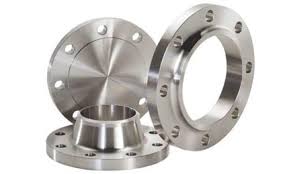
Pipingprojects.us is a reputed Flanges Manufacturer in USA. We produce and supply a variety of flanges, including lap joint, weld neck, orifice, slip-on, and others. We produce high-quality flanges from a range of materials. Nickel, molybdenum, and chromium are among the most common alloy steel flange materials. Chrome moly flanges are well-known for their superior corrosion and oxidation resistance. We are one of the leading flange supplier in USA.
What is a Flange?
A flange is a mechanical part used to connect pipes and fittings. It is typically a round disc or collar-like structure that forms a junction between two sections of a piping system. The connection can be bolted or welded, allowing for easy disassembly without cutting the pipe, facilitating inspection and repairs. The two mating flanges are joined using bolts, while a gasket is placed between them to ensure a tight, leak-proof seal.
Types of Flanges
Flanges come in various types, each with unique characteristics suited for specific applications. The common types include:
- Weld Neck Flanges
- Weld neck flanges are designed for high-pressure applications. They have a long, tapered hub that provides strength and stability, allowing for easy identification of pipe grades. The flange is welded to the pipe, reducing the risk of stress concentrations. These flanges are used in critical industries like oil refineries, chemical plants, and nuclear power plants.
- Slip-On Flanges
- Slip-on flanges are simpler and more affordable compared to weld neck flanges. These flanges slide over the pipe and are welded both on the inside and outside, providing a secure connection. They are used in low-pressure applications, such as water pipelines and HVAC systems, where high precision is not required.
- Blind Flanges
- Blind flanges are used to close off the end of a pipe or a valve. These solid discs have no hole for the pipe to pass through, making them ideal for pressure testing, maintenance, or isolating a piping section. Blind flanges are common in high-pressure systems to ensure complete blockage of the pipeline.
- Socket Weld Flanges
- Socket weld flanges are designed for smaller, high-pressure pipes. The pipe is inserted into the flange, and the connection is secured with a fillet weld. This flange is used when precise alignment is critical. Industries such as gas processing, shipbuilding, and chemical manufacturing often use socket weld flanges for piping systems.
- Lap Joint Flanges
- Lap joint flanges are used in conjunction with a stub end, which is welded to the pipe, allowing the flange to move freely. This design allows for quick assembly and disassembly, making them ideal for systems that require frequent maintenance. Lap joint flanges are typically used in low-pressure applications like food processing and pharmaceutical industries.
- Threaded Flanges
- Threaded flanges are unique in that they are threaded to the pipe, rather than welded. This makes them ideal for small-diameter pipes in low-pressure applications. Since no welding is involved, they are commonly used in applications where heat could damage the pipe material, such as in certain chemical processing operations.
Importance of Flanges in Piping Systems
Flanges play a critical role in ensuring the efficiency and safety of piping systems. Their ability to form leak-proof, durable connections helps maintain the integrity of pipelines. The ease of assembly and disassembly that flanges provide is essential for quick repairs, maintenance, and inspection of pipelines, reducing downtime in industrial processes.
Additionally, flanges are important for testing and safety. Blind flanges, for example, allow sections of a pipeline to be isolated and pressure-tested. In industries like oil and gas, where high-pressure systems are common, flanges ensure that pipelines can be properly sealed, avoiding costly and dangerous leaks.
We are Flanges Supplier In:
- Flanges Supplier in Texas
- Flanges Supplier in California
- Flanges Supplier in Florida
- Flanges Supplier in New York
- Flanges Supplier in Los Angeles
Applications of Flanges
Flanges are used across numerous industries, each having unique demands for strength, pressure tolerance, and material compatibility. Some common applications include:
- Oil and Gas: High-pressure pipelines and critical fluid handling require flanges with robust materials and designs, like weld neck flanges, to withstand extreme conditions.
- Chemical Plants: Corrosive materials demand high-quality flanges made from materials like stainless steel and other corrosion-resistant alloys.
- Water Treatment: Flanges in water treatment plants are vital for maintaining water flow and ensuring that equipment can be easily inspected or replaced.
- Power Generation: In power plants, flanges help manage high-pressure steam and fluid transfer systems, ensuring efficient energy production.
Flanges Manufacturer In USA
We are the leading flange manufacturer. These flanges can be manufactured by forging or casting. These components, available from renowned stainless steel flange manufacturers, are used to strengthen or connect beams and columns. When installing stainless steel pipe flanges, a certain flange type is necessary to provide a precise and secure fit and seamless integration into the piping system.

































